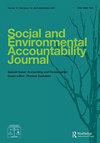Angry Birds – The Use of International Union for the Conservation of Nature Categories as Biodiversity Disclosures in Extinction Accounting
Q2 Business, Management and Accounting
Social and Environmental Accountability Journal
Pub Date : 2021-02-15
DOI:10.1080/0969160X.2021.1881577
引用次数: 2
Abstract
ABSTRACT The purpose of this research is to provide an account of whether extinction accounting and the use of IUCN categories offers a valuable and feasible addition to biodiversity disclosures for an organisation that has a professional interest in conservation programmes. Specifically, when and where IUCN categories can be used as biodiversity disclosures to address the threat of extinction. This study is based on a single anomalous case a Nordic zoo, located in Sweden, which has focused its operations exclusively on the conservation of threatened species and is the only zoo in Europe to do so. In order to comprehend the use of IUCN categories the annual report and the corporate website of Nordic Zoo have been examined. An open-ended interview with zoo management has been conducted to learn the intentions behind such specific disclosures and the use of IUCN categories. The findings of this study reveal that IUCN categories are appropriate biodiversity disclosures for highlighting extinction threats to various species. In an organisation with a professional interest in practicing conservation programmes, IUCN categories play a central role in communicating with stakeholders. This study demonstrates that biodiversity disclosures are part of a sincere effort to report on conservation.愤怒的小鸟-使用国际自然保护联盟分类作为灭绝会计中的生物多样性披露
摘要本研究的目的是说明,对于一个对保护计划有专业兴趣的组织来说,灭绝核算和国际自然保护联盟类别的使用是否为生物多样性披露提供了一个有价值和可行的补充。具体而言,何时何地可以将国际自然保护联盟类别用作生物多样性披露,以应对灭绝威胁。这项研究基于一个异常案例,一家位于瑞典的北欧动物园专注于濒危物种的保护,是欧洲唯一一家这样做的动物园。为了了解世界自然保护联盟类别的使用情况,我们查看了北欧动物园的年度报告和公司网站。对动物园管理层进行了一次开放式采访,以了解此类具体披露背后的意图以及国际自然保护联盟类别的使用。这项研究的结果表明,国际自然保护联盟的分类是适当的生物多样性披露,以突出各种物种的灭绝威胁。在一个对实施保护计划有专业兴趣的组织中,国际自然保护联盟类别在与利益相关者沟通方面发挥着核心作用。这项研究表明,生物多样性披露是报告保护情况的真诚努力的一部分。
本文章由计算机程序翻译,如有差异,请以英文原文为准。
求助全文
约1分钟内获得全文
求助全文
来源期刊

Social and Environmental Accountability Journal
Business, Management and Accounting-Accounting
CiteScore
3.90
自引率
0.00%
发文量
16
期刊介绍:
Social and Environmental Accountability Journal (SEAJ) is the official Journal of The Centre for Social and Environmental Accounting Research. It is a predominantly refereed Journal committed to the creation of a new academic literature in the broad field of social, environmental and sustainable development accounting, accountability, reporting and auditing. The Journal provides a forum for a wide range of different forms of academic and academic-related communications whose aim is to balance honesty and scholarly rigour with directness, clarity, policy-relevance and novelty. SEAJ welcomes all contributions that fulfil the criteria of the journal, including empirical papers, review papers and essays, manuscripts reporting or proposing engagement, commentaries and polemics, and reviews of articles or books. A key feature of SEAJ is that papers are shorter than the word length typically anticipated in academic journals in the social sciences. A clearer breakdown of the proposed word length for each type of paper in SEAJ can be found here.
 求助内容:
求助内容: 应助结果提醒方式:
应助结果提醒方式:


